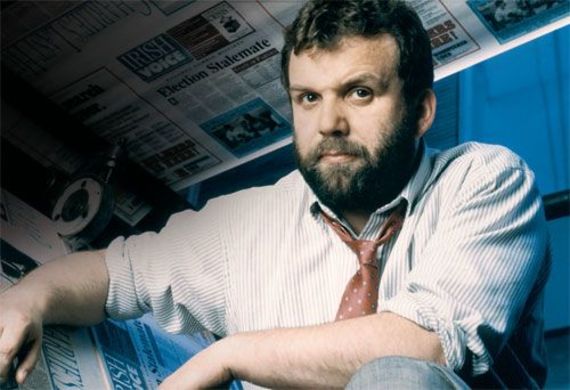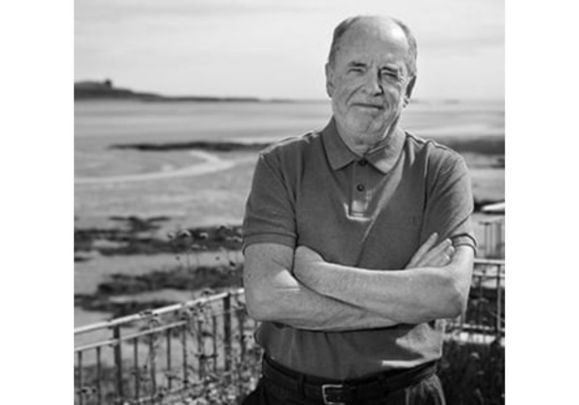After 34 years of weekly columns for the Irish Voice, John Spain is calling it a day.
I used to think my weekly Irish Voice column, which has been running for 34 years, must be some kind of record. But no, I'm trailing behind some of the great Americans.
Art Buchwald of The Washington Post wrote three columns a week from 1950 until 1986 when he cut it to twice weekly and continued until his death in 2007. His column was syndicated to newspapers around the world, including the Evening Press in Dublin where I used to read it as a student already dreaming about a life in journalism.
Buchwald was not the only long-serving columnist in the U.S. There were a dozen or more who wrote columns over three or four decades, including the great Irish Americans Jimmy Breslin and Pete Hamill.
My favorite story about American columnists concerns the Atlanta Journal's Lewis Grizzard who died too young at 47 after two decades of daily columns (a much tougher task than a weekly column). Writing a daily column, he said, is "like being married to a nymphomaniac…it’s a whole lot of fun for the first week.”
The story goes that the legendary Grizzard was once propositioned by a prostitute in a bar in Mexico. “For one hundred American dollars I do anyteeng you want,” she said. Grizzard exclaimed, “Thank you, Jesus!” He pulled out two fifties and said, “Here. Go upstairs and write my next column.”
There have been only a few weeks over the last 34 years when I felt the same. Whenever that happened in recent years I would say to the Irish Voice Editor Debbie McGoldrick to get someone younger. “You're irreplaceable,” she would reply.
It wasn't true, of course. But it was encouraging to hear, so I kept the column going. It is ending today only because of ill health.
Becoming the Irish Voice
It's been an honor to have had such a platform for more than three decades. And like many of the good things in life, it happened by accident.
Back in the mid-1980s I was features editor of the Irish Press and needed someone to do a weekly column from New York to cover the new wave of Irish emigration at the time. The editor of the Press, the historian Tim Pat Coogan, suggested a young journalist he had met over there called Niall O'Dowd. I'd never heard of him, but O'Dowd's “Letter From America” soon became part of the Irish Press at the time.

Founder of the Irish Voice and IrishCentral, Niall O'Dowd.
A couple of years later, in 1987, O'Dowd called me one day and turned the tables, asking me if I would do a column for a new weekly paper he was starting in New York called the Irish Voice.
And that's how “Ireland Calling” started. At more than 1,500 words a week, for 34 years, that adds up to around two and a half million words, not bad for a two-finger typist. It's equivalent to 25 average-sized books. This seems a lot, except that it quickly became a routine part of my working week and rarely felt like a chore.
Over the years I did most jobs in newspapers in Dublin. On the Irish Press, I was assistant editor to Coogan. Subsequently, on the Irish Independent, I was an editorial writer, supplements editor, features editor, and, finally, books editor.
One of the good things about doing the books pages is that it's not so pressured. Away from the daily news grind, you get time to think about what's happening. That made it easier for me to keep doing the Irish Voice column for much longer than I ever expected when I began.
While I was doing my various editorial jobs in Dublin over the years, O'Dowd went on to much greater things than journalism. He became a player rather than an observer, a key figure on a much bigger stage. Not many of us can say that we helped to change the history of our country, but O'Dowd can because he did just that.
And the Irish Voice was part of the process. The paper was a breath of fresh air in Irish America, bright, modern, unsentimental, but still conscious of its heritage. It bridged the gap between the Irish America that was there from the 1950s or earlier and the Irish who had arrived during the depressed 1980s at home.
In the column I wrote every week I set out to reflect what I heard people talking about at work, in the bar, on The Late Late Show on RTE. I was trying to inform and entertain the people of my generation who had gone to America and to update the Irish Americans of earlier generations who were often unaware of what the new Ireland was becoming.
The Troubles
Too often in the early years, the column was consumed by the latest atrocity in the North. I had started in the Irish Press early in 1971 just as The Troubles began, and 10 years later I was assistant editor of the paper when the hunger strikes happened in 1981. I remember several late nights in the office delaying the next edition because a hunger striker was at death's door.
So in 1987, when the Irish Voice started, I had been dealing with this for nearly two decades. The violence was still going on (that was the year of the Enniskillen bomb) and by then, like most people here, I was sick of it.

"Welcome to hell": Soldiers in the streets of Northern Ireland during The Troubles.
It seemed to be endless, month after month, year after year. It was not just the brutality that got to me. It was the futility of it all, the idea that you could bomb the Brits out and a million unionists would then accept a united Ireland.
So when I started writing for the Irish Voice in 1987 I had already been watching the mayhem in the North for a long time and I had run out of patience. A lot of that frustration came out in the columns I wrote in the early years. The condemnatory language I used was a shock to some Irish Americans, especially the ones who were putting dollars into IRA collection buckets at the time.
The result was furious letters to the Irish Voice calling me a West Brit and canceling subscriptions. But there were also some readers in America who wrote to the paper to agree with me and were brave enough to put their names at the end of their letters.
After a few years of this, my column had achieved a kind of notoriety in some sections of Irish America and I had become a minor hate figure. But O'Dowd never censored anything I wrote and never asked me to tone down what I was saying.
By then he was probably sorry he had ever heard of me, but he stuck with it. A lesser editor would have quietly dumped the column.
The irony was that the views I was putting forward were commonplace in the media in Ireland at the time because they reflected what the vast majority of people here thought. Even the direct language was the same. Only in parts of Irish America did it seem like a betrayal.
O'Dowd knew that, but it was probably small comfort to him as the Irish Voice letters page filled up with demands that I be fired. Eventually, he found the answer. He invited Gerry Adams to do a weekly column as well!
Modern Ireland
That all seems like a long time ago now. Peace in the North changed everything. After that, I was able to write about everyday life here, about the economy, about social change, about the development of the country. The column usually was prompted by whatever was the most talked about story of the week here.
And there was never a shortage of things to write about. Ireland changed over the 34 years of the column, and so did Irish America. We're all a lot older now, and maybe a bit wiser.

A yes vote for marriage equality in Ireland, in 2015.
On the Northern Ireland question, in particular, there is a wider acceptance that history has left us with a complex problem that has no easy solution. The unionists have been in the North since the time the Pilgrims arrived in America. Ireland is their country as well, even if they regard themselves as British.
There is more understanding now that reunification can only happen by bringing people together. And whenever that happens -- if it does -- it will produce a very different Ireland from the one we have today.
From the mid-‘90s onwards there was the Celtic Tiger and the excesses of the boom to write about. After 2008 there was the crash and the loss of our economic sovereignty, a national humiliation. Then there was the recovery, although we still face huge challenges and are laden with debt.
Alongside all this was our slow progress towards social change. From being one of the most conservative societies in Europe after we gained our independence -- we had swapped British rule for Rome's rule -- we eventually evolved into one of the more liberal. But it was a painful path, with bitter arguments about contraception, divorce, abortion, and much more.
All of this made columns for me. And it was not just those individual issues but the general loosening of the Catholic Church's control in important areas of Irish life like health and education. We are still coming to terms with all of that and with the revelations about abuse in the institutions run by religious orders.
Covering all this in the column over the past 34 years gave me -- and I hope my readers -- an insight into how we developed as a country. We're still evolving, but we have made remarkable progress. The next few years will be particularly interesting since we are likely to see Sinn Fein in government in the south as well as in the North.
How successful that will remain to be seen. There is a lot of concern here about their socialist views and vast spending plans which could wreck the economy.
But behind all the left-wing populism they are a single issue party -- reunification -- and that will take precedence over anything else. As soon as they get into government they are likely to abandon all that radical stuff.
Since 2009, my Irish Voice column has also appeared on IrishCentral. This widened my weekly readership and the feedback was always interesting.
Over the years I stuck to a self-imposed rule never to respond to letters or online comments. I got to say my piece in the column. The letters and comments were space for the readers to have their say and I did not interject, tempting though it was sometimes to reply.
When the Irish Voice was celebrating its 25th anniversary Debbie McGoldrick dug out my column from the first edition of the paper in 1987. It was commenting on the controversy over a Newsweek interview with the then Minister for Foreign Affairs Brian Lenihan in which he had claimed that there was nothing wrong with Irish people emigrating in large numbers, as they were in the 1980s.
"We can't all live on a small island,” Lenihan had said bluntly, not something any Irish politician is ever supposed to admit.
There were several waves of emigration after that, of course, depending on the state of the economy. But even when we are doing well here the Irish still like to experience the wider world. It has been my privilege to be a voice from home for them for so long.
I am grateful to Niall O'Dowd, Debbie McGoldrick, and all you readers who stayed with me over so many years.




Comments